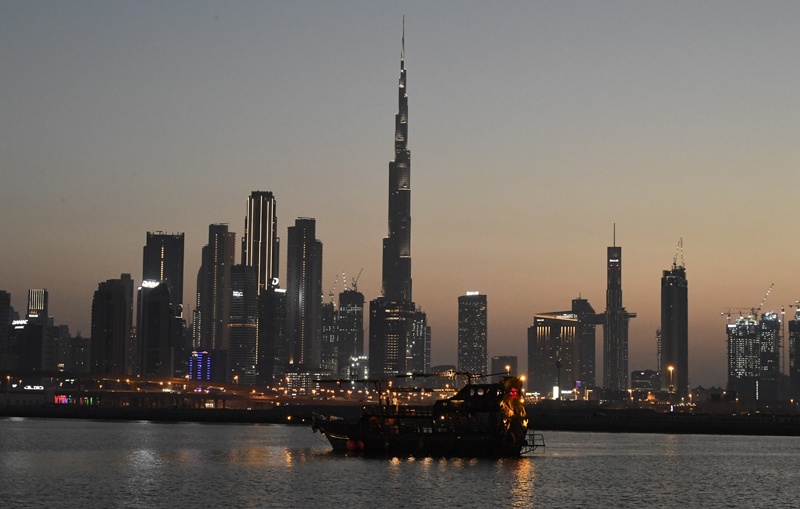
DUBAI: A decade on, the turmoil of the Arab Spring which shook the oil-rich Gulf states has left a very different legacy, emboldening and empowering them. The collapse or decline of traditional Middle East powers like Syria and Egypt has allowed the Gulf to establish itself as the Middle East's new center of gravity.
And the Gulf countries have seized the initiative, accelerating the transformation of their societies, building futuristic metropolises and breaking conventions with diplomatic initiatives, including establishing ties with Israel. "The weakening of traditional Arab centers of power due to the Arab Spring… has made the Gulf, for the first time in modern history, the center of Arab power," said Bader Al-Saif, assistant professor of history at Kuwait University.
The Arab world was convulsed by popular uprisings starting in 2011, with street protests in several countries against despised regimes. Egypt and Tunisia's dictators were toppled. But the revolutionary wave descended into bloody civil war in Syria, Libya and Yemen. In Egypt, the army retook power in 2013, followed by a brutal crackdown. Cairo, previously the Arab world's cultural capital, became a byword for abuses and grinding poverty.
Once feared and powerful, Syria as well as Iraq - shattered by the US invasion of 2003 - became synonymous with devastating conflict, refugee camps, and foreign meddling. The Gulf was not entirely spared the tumult seen elsewhere, with protests rocking Oman and Bahrain - the latter put down principally with Saudi assistance. But the chaos elsewhere threw the soaring wealth and prosperity of the United Arab Emirates and Qatar into stark relief as expats were lured by glittering skyscrapers and lavish tax-free packages.
The Arab Spring was an "eye-opener" for the Gulf nations, close partners of Washington, as they witnessed the US inaction when Egypt's and Bahrain's regimes were threatened. "(They realized) they needed to take matters in their own hands and that there is no continuous security guarantee from the US," Saif told AFP. The Arab Spring was just the watershed moment, he said, adding that Gulf countries had already been eyeing greater influence well before 2011.
"The Arab Spring didn't start this trend, it accelerated and brought it out into the open," said Abdelkhaleq Abdallah, a politics professor in the UAE where, along with Qatar, the trend was most noticeable. Fearing that 2011 uprisings could reach their kingdoms, the Gulf Cooperation Council reached out to Jordan and Morocco giving them financial support to help fund social reforms in a bid to maintain stability, observers said.
Saudi had the greatest financial firepower as the world's leading oil exporter, and influence among Muslims whose two holiest sites are in the kingdom. But it was Qatar that "turned the Arab Spring to its advantage", Abdallah said, playing an outsized part with rolling coverage of events by its Al Jazeera broadcaster, followed by the empowerment of Islamist movements, notably in Tunisia and Egypt. The Emirates benefited too, presenting itself as a regional safe haven and attracting investment to Dubai, one of the country's seven emirates which was badly hit by 2010's economic crisis.
While other Middle East players faced instability and poverty, Qatar prepared for the 2022 World Cup, the Emirates sent an astronaut into space, and Riyadh held the G20 presidency. As their influence grew, the trio vied for supremacy, said Emma Soubrier, a researcher at the Arab Gulf States Institute in Washington. In 2017, several Arab nations, most prominently Saudi Arabia and the UAE, cut ties with Qatar accusing it of backing Islamist movements and fomenting unrest through Al Jazeera. Doha has always denied the charges.
In Libya, Abu Dhabi backed strongman Khalifa Haftar against the forces of the UN-recognized government which it accused of colluding with Islamists and receiving support from Turkey and Qatar. Soubrier said the intervention, without the backing of the UN, marked a turning point. "A message was sent to (their) Western partners that the Emirates were now a regional power capable of guaranteeing their interests, by military strikes if necessary," she said.
Saudi Arabia has been involved in its own overseas entanglement since 2015, leading a coalition in Yemen including the Emirates that supports government forces against Houthi rebels backed by Riyadh's archrival, Iran. The Gulf has also gone against the grain diplomatically, in the case of Bahrain and the UAE which normalized ties with Israel in September - upending decades of Arab boycott.
Unlike the region's former powers, and modern Qatar, the UAE and Saudi have rejected the notions of "pan-Arabism and pan-Islamism" revitalized by the Arab Spring, according to Saudi researcher Eman Alhussein. "Nationalism is not exclusive to the Gulf region as it has been gaining momentum around the world," said the expert, adding that raw power was now more important than sentiments on the fabled "Arab street". - AFP









